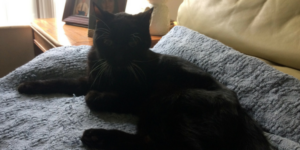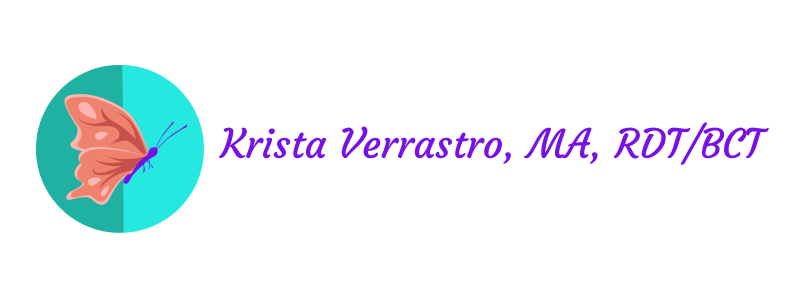
My family lost our beloved cat, Dribbles (pictured above), this month. As is the case with many companion animals it’s hard to pinpoint his exact age due to the nature of his rescue story, but he was with my family for over 20 years. Dribbles was my favorite companion animal, and I will miss him dearly.
Dribbles’ death got me reflecting on a topic that I have been meaning to share here for a while, which is that of the healing role of animals in human lives.
My Personal Connection to Animals
When I was a young child, the death that had the greatest impact on me was that of my first pet, Rascal. I was in 4th grade when he died. I had known him all my life. I felt the loss deeply.
Not long after Rascal’s death, my family got our first pet rabbit, who I named Thumper. When I saw Thumper at the pet store, alone in a cage, my heart broke. I sobbed to my parents that we needed to take her home because she was lonely and sad. From then on, up until just a few years ago, my family always had a pet rabbit.
When I was 15, I took a vacation with some friends to a ranch in the Catskill Mountains. I enjoyed spending time with a variety of animals while at the ranch. By the end of the vacation, I realized that I could not eat meat anymore. I had come to view animals as friends. This is the same reason why I went vegan 7 years ago upon learning about the harm that comes from eating animal products.
These are just some of many examples of how I have often felt connected to animals.
Given this connection to animals, it probably comes as no surprise that I found a way to incorporate animals into my work as a therapist. I wrote my Master’s thesis on the healing power of animals, both real and imagined, in therapy. In regards to real animals, my thesis explored animal-assisted therapy as well as studies that show the positive effects companion animals have on people. In regards to imagined animals, it explored the healing power of animal characters in stories and role plays.
What I Discovered About the Healing Role of Animals
While writing my thesis, I read about several studies that demonstrated the healing power of animals. One study showed that all pet owners had a better chance of health and longevity, regardless of what type of pet they had or if they exercised with their pet. Another study showed that married and single pet owners survived heart disease at the same rate, which led the researchers to conclude that pets enhance one’s social network and do not merely replace it. Other studies showed that peoples’ blood pressure lowered when they were in the room with a pet or talking to a pet. Thus, it appears that many people find animals to be healing.
Without going into too much detail since my thesis is long (it’s almost 100 pages!), here are some of the reasons I found for animals being healing for people.
In short, being connected to animals helps us better define what it means to be human. When we allow ourselves to have such a connection, we are able to see how we are both similar to and different from animals.
Throughout time, people have both feared and revered animals that are seen as strong, fast, dangerous, or exotic. Groups of people have often identified with a particular animal, sometimes believing themselves to be related to the animal or having access to that animal’s traits or powers. For such people, the connection to animals not only provides inspiration and guidance but also often influences spiritual and social customs.
Many people feel connected to their spirituality when feeling connected to animals. They may feel admiration and awe in regards to animals such as bees getting agitated and returning to their hives before stormy weather, birds innately knowing when it’s time to migrate, and salmon overcoming many obstacles in order to give birth and die in the same location. People may also feel connected to the past when connecting with animals since many animals have existed prior to humankind.
As mentioned in this prior article I wrote, one view of health in drama therapy is to be able to accept and be in touch with seemingly paradoxical roles we play. We often distinguish ourselves from animals because we see ourselves as civilized while seeing animals as uncivilized. For example, we often pride ourselves in being able to censor our desires for the sake of politeness or what is better for us in the future. However, each one of us has a part of us that is more animalistic, which famous psychologist Carl Jung referred to as the shadow side. This part of us is thought not to be evil but to be primitive or childish. Jung believed that one can live their most fulfilled life if they confront their shadow side. This involves having a better understanding of one’s drives and desires. This is similar to the idea in drama therapy that a healthy person acknowledges and accepts having child and adult roles, sick person and healthy person roles, saint and sinner roles, etc. within them. Thus, being in touch with the animalistic side of ourselves helps us be better humans.
Children tend to imitate and relate to animals more during childhood because it is easier to understand emotions through animals. This is because children tend to need to externalize and physicalize feelings to understand them, and animals do just that due to their lack of language. Also, animals’ emotions are less layered. For example, a cat whose tail was just stepped on might screech loudly while hitting the person who did it with his claw because he’s reacting out of pure anger and defense. Meanwhile, a person whose feelings were hurt by a friend might feel a mix of anger, sadness, hurt, and worry and might fluctuate between withdrawing and yelling at their friend.
Speaking of that cat whose tail got stepped on, the fact that he probably rubbed against the person who accidentally did that with much love and affection 5 minutes later brings me to one of the major reasons animals are healing, which is that of unconditional love. Animals don’t care what our age is, how much we weigh, what color our skin is, etc. They love us uncritically and without reserve.
Because of this unconditional love, we often let animals participate in our lives in ways that we don’t always let other people do. For example, we often let animals be in the bathroom with us, sleep with us, cuddle with us when we’re sick, and listen in on private conversations. Sometimes we even tell our secrets to our pets.
Animals are also healing to us because they give us the opportunity to drop our roles around them. I introduced this idea of dropping roles in this article about nature, so you can refer to it for more details. In short, animals don’t hide behind certain roles or play mind games like some people do. Humans and animals are free to be fully present together during interactions because of this and because of the fact that animals are not aware of the past and future. Also, animals live in their own reality, which allows them to be playful and authentic because they do not conform to societal norms like we people do. Thus, when with them, we often become more playful and authentic, too.
Last but not least, caring for animals gives people a sense of purpose, and we often find even more purpose when doing rituals with animals. For example, a morning walk with your dog or evening snuggles with your cat might be rituals that give your daily life meaning, comfort, and predictability. You can learn more about the importance of rituals in this prior article.
Contact me
Feel free to comment below with any stories you have about your relationship with animals or to let me know if you agree with my reasons why animals are healing.
If you are grieving the loss of a beloved pet or are wishing to work with therapist who shares your love of animals, contact me for a free 15 minutes consultation to see if we are a good fit to work together.
